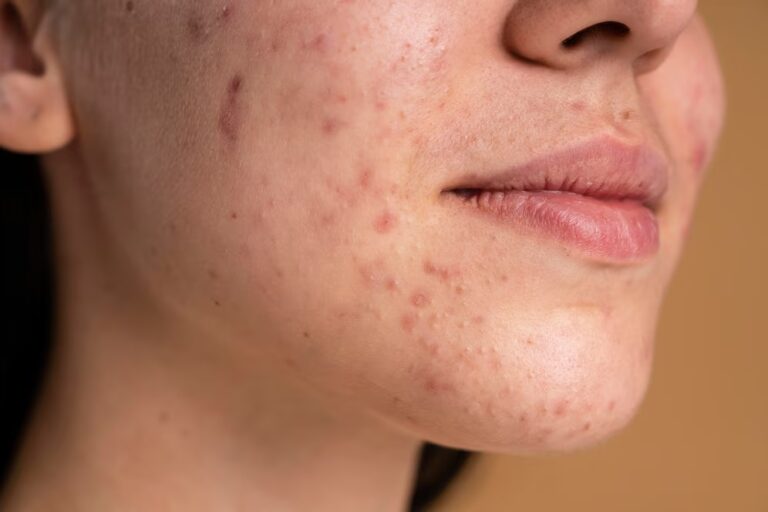The primary causes of acne include:
- Excess Oil Production: Overactive sebaceous glands produce more oil, leading to clogged pores.
- Hormonal Fluctuations: Changes in hormones, particularly during puberty, menstruation, pregnancy, or stress, can trigger acne.
- Bacteria: The presence of Propionibacterium acnes bacteria can contribute to inflammation and breakouts.
- Diet and Lifestyle: A diet rich in processed foods or dairy, as well as lack of sleep or stress, can worsen acne.
- Medications and Cosmetics: Certain medications, including corticosteroids or some birth control pills, and comedogenic (pore-clogging) cosmetics can trigger acne.
Common Types of Acne
Acne can appear in different forms, each requiring specific treatments. These include:
- Whiteheads: Small, closed pimples that appear when hair follicles become clogged with oil and dead skin cells.
- Blackheads: Open pimples where the pore is clogged but the surface remains open, causing the material to oxidize and turn black.
- Papules: Small, red, inflamed bumps that are tender to the touch.
- Pustules: Pimples with a visible white or yellow center filled with pus.
- Cysts: Large, painful lumps deep beneath the skin that can result in scarring if not treated properly.
Acne Treatment Options
Effective acne treatment varies based on the severity of your acne and your skin type. Below are the most common treatments used to manage and eliminate acne:
1. Topical Treatments
- Benzoyl Peroxide: A common over-the-counter acne treatment that kills acne-causing bacteria and reduces inflammation. It is effective in treating mild to moderate acne.
- Salicylic Acid: A beta hydroxy acid (BHA) that helps exfoliate the skin, unclog pores, and reduce acne. Salicylic acid is effective for blackheads, whiteheads, and minor acne.
- Retinoids (Retinol, Tretinoin): Derived from Vitamin A, retinoids help increase cell turnover, reduce clogged pores, and prevent new breakouts. They are highly effective in treating acne and acne scars.
- Topical Antibiotics: These include clindamycin and erythromycin, which help reduce inflammation and kill bacteria on the skin. Often combined with other treatments like benzoyl peroxide to prevent resistance.
2. Oral Medications
For more severe cases of acne, oral medications may be necessary:
- Oral Antibiotics: Medications like tetracycline, doxycycline, and minocycline can be prescribed to reduce bacteria and inflammation in moderate to severe acne.
- Oral Contraceptives: Birth control pills that contain estrogen can help regulate hormones and reduce acne, especially in women.
- Isotretinoin (Accutane): This powerful oral medication is typically prescribed for severe, cystic acne that hasn’t responded to other treatments. It works by reducing oil production, preventing clogged pores, and decreasing inflammation.
3. Chemical Peels
Chemical peels involve applying a chemical solution to the skin that exfoliates and removes the top layers of dead skin cells. This process can reduce acne breakouts, improve skin texture, and minimize scarring. Peels are particularly effective for individuals with stubborn blackheads, whiteheads, and mild acne.
4. Laser and Light Therapy
Laser treatments and light therapy can be effective for treating acne by targeting bacteria and reducing inflammation:
- Laser Therapy: Laser treatments, such as fractional CO2 or intense pulsed light (IPL), can reduce acne lesions and improve skin texture by stimulating collagen production.
- Blue Light Therapy: This treatment targets acne-causing bacteria deep within the skin, helping to reduce active breakouts without harming the surrounding skin.
- Red Light Therapy: This therapy reduces inflammation and accelerates healing, making it useful for both active acne and acne scars.
5. Extraction and Drainage
For large cystic acne or stubborn pimples, a dermatologist may perform an extraction to manually remove the contents of clogged pores. This should always be done by a professional to avoid scarring or further irritation.
6. Microneedling
Microneedling involves using tiny needles to create micro-injuries in the skin, stimulating collagen production and helping to improve the appearance of acne scars. It can also help unclog pores and promote clearer skin over time.
Preventing Acne
While acne cannot always be prevented, there are steps you can take to minimize the likelihood of breakouts:
- Follow a Consistent Skincare Routine: Cleanse your skin gently twice a day to remove excess oil, dirt, and bacteria. Use non-comedogenic products that won’t clog your pores.
- Avoid Touching Your Face: Picking or squeezing pimples can introduce bacteria and cause further inflammation and scarring.
- Use Sunscreen: Protect your skin from sun damage, which can worsen acne and make scars more noticeable.
- Maintain a Healthy Diet: Eat a balanced diet rich in antioxidants, omega-3 fatty acids, and vitamins to support your skin’s health. Limit processed foods and sugary snacks that can trigger breakouts.
- Manage Stress: High levels of stress can trigger hormonal changes that contribute to acne flare-ups, so it’s important to manage stress through relaxation and self-care practices.
When to See a Dermatologist
If your acne is severe, persistent, or causing scarring, it’s time to consult with a dermatologist. A professional can assess your skin, provide personalized treatment recommendations, and prescribe stronger medications or therapies that may be necessary for more severe acne.
Conclusion
Acne is a treatable condition, and there are a wide variety of treatment options available to help you achieve clear, healthy skin. From over-the-counter topical products to professional treatments like lasers and chemical peels, the right acne treatment depends on the severity of your acne and your skin’s unique needs. With the right care, you can effectively manage acne and prevent long-term scarring, restoring your skin’s clarity and confidence.

